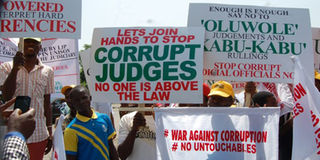Nigerians protest against 'corrupt' judges

What you need to know:
- The protesters marched to the Supreme Court, asking all judges arrested by the Department of State Services (DSS) to step aside, pending the outcome of their trials.
- They condemned the National Judicial Council (NJC) for supporting the 'corrupt’ judges.
AFRICAREVIEW , Abuja. Angry mobs Wednesday took over the streets of Nigeria's capital Abuja and occupied the Supreme Court to protest against corruption in the Judiciary.
The protesters marched to the Supreme Court, asking all judges arrested by the Department of State Services (DSS) to step aside, pending the outcome of their trials.
They condemned the National Judicial Council (NJC) for supporting the 'corrupt’ judges.
The protesters carried placards with inscriptions such as: “Stop corruption before it stops you,” “Don’t get it twisted, Judiciary is not on trial, only corrupt officials are.”
NJC Chairman, also the Chief Justice of Nigeria, Justice Mahmoud Mohammad, had criticised the police for the arrest of the judges.
All the judges were still sitting in their courts despite the public outrage.
One of them, Justice Adeniyi Ademola, in whose home, millions of naira were found, vowed to stay in office
The judge who presided over cases before his court on Tuesday, advised parties before him to apply for transfers if they were not comfortable continuing their matters before him.
“As far as we are concerned, we have been asked to maintain our seats, so that is the position of things,” he said.
DSS operatives stormed Justice Ademola’s home and six other judges' on October 7-8 in search of incriminating documents.
Other judges affected by the sting operations were justices Sylvester Ngwuta and John Inyang Okoro of the Supreme Court; Justice Nnamdi Dimgba of the Federal High Court in Abuja and Justice Mu’azu Pindiga of the High Court, Gombe
NJC has said the call by the President of the Nigerian Bar Association (NBA), Mr Mahmoud Abubakar, for the suspension of the seven judges accused of corruption was “unacceptable”.




